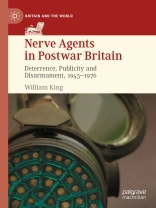This book reveals the nature and level of British engagement with controversial and lethal nerve agent weapons from the end of the Second World War to Britain’s submission of a draft Chemical Weapons Convention. At the very heart of this highly secretive aspect of British defence policy were fundamental questions over whether Britain should acquire nerve agent weapons for potential first-use against the Soviet Union, retain them purely for their deterrence value, or drive for either unilateral or international chemical weapons disarmament. These considerations and concerns over nerve agent weapons were not limited to low-level defence committees, nor were they consigned to the periphery, but featured prominently at the highest levels of the British government and defence planning. Importantly, and despite stringent secrecy, the book further uncovers how public scrutiny and protest movements played a substantial and successful part in influencing policy and attitudes towards nerve agent weapons.
Table of Content
Chapter 1. Introduction.- Chapter 2. British Defence Policy and the Nerve Agents in Postwar Britain, 1945–1950.-Chapter 3. A Step Too Far: The Nerve Agents and the Global Strategy Paper, 1951–1953.- Chapter 4. Drift, Decline, and a Stubborn Prime Minister, 1954–1957.- Chapter 5. Another Reverse Course: From Dependence to Acquisition, 1958–1963.- Chapter 6. A ‘Secret Deterrent’ and a ‘Campaign of Criticism’, 1964–1969.- Chapter 7. From the CS Debacle to the Rise of CW disarmament, 1970–1976.- Chapter 8. Conclusion: From Discovery to Disarmament.
About the author
William King is a Research Fellow at the German Historical Institute London, UK.












